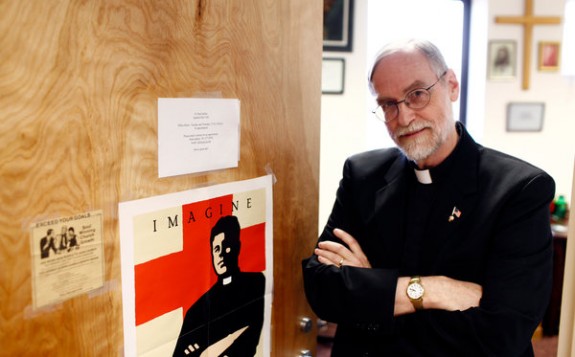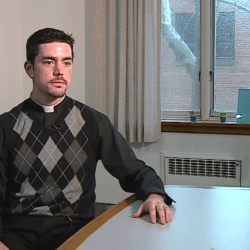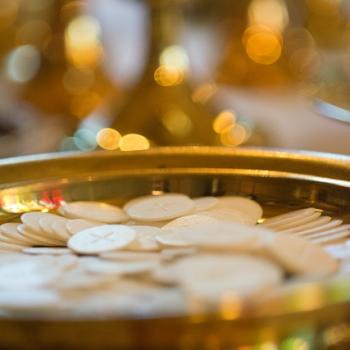
Some in the church are taking a closer look at the married priesthood, with one married priest about to release a book on the subject.
From the August issue of U.S. Catholic:
Father Donald Paul Sullins, a married priest and sociologist at Catholic University of America in Washington, has researched the reactions of American Catholics to the married clergy for a book he is writing, Married Catholic Priests (Oxford), to be published next year.
He interviewed nearly all of the Pastoral Provision priests, who said they had been overwhelmingly well received by American Catholics. None had any serious negative reactions to their priesthood. They experienced support, acceptance, and welcoming.
It’s also true that some American Catholics have been open to the ordination of married priests because they believe all priests should be married.
Father David Cooper, pastor of St. Matthias Parish in the Archdiocese of Milwaukee, has been a proponent for an open discussion about a married priesthood.
“We’ve had a married priesthood in the Catholic Church for more than 2,000 years,” he says, referring to the non-Latin rite churches such as the Ukrainian and Maronite Catholic churches. “In the Eastern churches it hasn’t caused much of a problem at all.
“Why is it that the Holy See is able to make exceptions that seem to benefit those who are on the right of theological issues, who are very orthodox and very conservative and very traditional in their outlook, but we can’t seem to get any understanding of the issues for the people on the other side of the spectrum? The Catholic Church is a very big umbrella, and under that umbrella there’s room for just about everybody.”
Sullins’ wife, Patti, says they have seven married ex-Catholic priests in their parish, some of whom are married to former nuns.
When her husband first began his part-time position as an assistant at the parish, “it really stirred up stuff” for some of the parishioners, she allowed.
One stood up at church at the invitation of Sullins and spoke at length about his frustration with the church and its celibacy requirements for priests. They have welcomed Sullins, she says. Still, “They feel cheated. They think it’s time for the church to welcome married priests.”
But that’s not what the Sullinses want.
“It’s a view with which most of us married priests emphatically disagree,” says Sullins. “Since most Pastoral Provision priests are very conservative or orthodox theologically, there is an irony in that the Catholics most likely to celebrate their presence tend to disagree with them about other things, while those who agree with them on church doctrine generally may not celebrate so much the fact that they are married. I was once at a meeting where a group of people in favor of a married priesthood gave me a standing ovation, which embarrassed me because I strongly support the rule of celibacy for priests.”
The married former Episcopal clergy believe their ordinations are an anomaly to the church tradition of celibacy, rather than a new norm.
“I don’t think we are any kind of bellwether for this at all,” says Bristow. “We are exceptions to the rule.”
Before any of the men were ordained Catholic priests, their wives had to agree to go through with it. Like Roman Catholic deacons, the Pastoral Provision priests cannot remarry if they are predeceased by their wives.
“There is a place and a reason for celibacy, as difficult as it may be,” says Father John Lipscomb, spiritual director of the Bethany retreat center in the Diocese of St. Petersburg, Florida, who has been married for more than 40 years. “To be a priest in the Catholic Church today is an overwhelming vocation,” he says, pointing to the larger workload carried by most Catholic priests.
You can read more here. Fr. Sullins also talked about the issue earlier this year in the pages of the New York Times:
There are about 80 such Catholic priests in America, says the Rev. D. Paul Sullins, a sociologist at Catholic University in Washington. Once an Episcopal priest himself, now a married Catholic priest, Father Sullins has interviewed over 70 married priests, and many of their wives, for a book he is writing. A vast majority are former Episcopalians, he says, though some came from other Protestant denominations.
The small cohort of married priests raises several questions. First, are they doing as good a job as other priests? If the church has decided that celibacy confers certain gifts on priests, does it follow that married priests are worse at serving their congregations? Second, wouldn’t celibate priests be a little resentful of colleagues who get to serve the church and have sex too? And third, if the married priests are doing a good job and not provoking envy, why keep the celibacy rule for priests in general?
To answer the first question, it is important to understand the rationale for the celibacy rule. (“Celibacy” refers to a life without marriage; “continence” is the term for living without sexual activity. In principle, celibate priests are also continent.) The church has never taught that celibacy is necessary to the priesthood. Rather, the tradition holds that that a priest performing the sacraments represents Jesus Christ, who was single. This idea of the priest in persona Christi, in the person of Christ, is also a prime rationale for why women cannot be Catholic priests.
Furthermore, Father Sullins says, there is the practical belief that “if a man’s not married, he’s able to devote himself more fully and exclusively to his parish.” But he has found that married priests are usually aided, not hindered, by their wives, who are very committed to the parish. And he adds that celibate priests can be less accessible than married priests.
“The truth is that celibate priests often have ways of walling themselves off,” Father Sullins says. “If you call a celibate priest’s rectory in the middle of the night, you’ll likely get an answering machine. But if you call a married priest in the middle of the night, and he is disinclined to go out, he will get an elbow from his life partner, saying, ‘Hey, you committed yourself to this work.’
“I don’t want to say the difference is great, but if there is a difference, it’s in favor of the married priest.”











